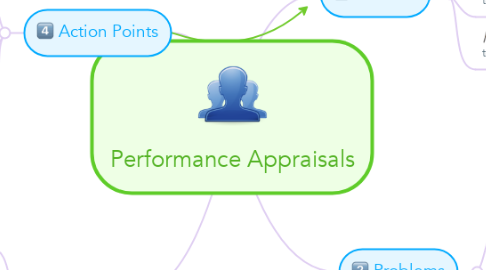Performance Appraisals
por abena asantewaa

1. Action Points
1.1. If performance in some area(s) does not meet standards, then agree to set frequent and regularly scheduled performance discussion
1.1.1. If performance in some area(s) does not meet standards, then agree to set frequent and regularly scheduled performance discussion
1.2. Provide the opportunity for feedback, not only during the meeting but by allowing your employee to respond to the evaluation in writing, detailing their disagreement or position
1.3. Before closing the meeting, be sure to ask if there is anything else the employee wants to discuss, thereby maintaining a conversational rather than confrontational tone.
2. Ideas
2.1. Have the employee complete a self-assessment to rate themselves first.
2.2. Establish specific performance standards and be specific when addressing areas requiring improvement, (i.e., facts, figures, work records, reports, etc.)
2.3. Be specific when addressing examples of unacceptable conduct (not general references to 'laziness' or 'bad attitude'), cite specific examples as much as possible
3. Reasons
3.1. To recognize good performance
3.2. to provide a basis for wage increase, promotions, transfers and possible terminations
3.3. to validate selection techniques to meet EEOC/AAP requirements
4. Problems
4.1. No appraisal system, regardless of how sophisticated, is completely objective
4.2. Personal prejudices can skew results, as can poorly defined standards of measurement
4.3. employees must view the system as fair and just for the results to impact their behaviors and job performance. If employees do not see the process as a credible one, it loses validity and value overall.


